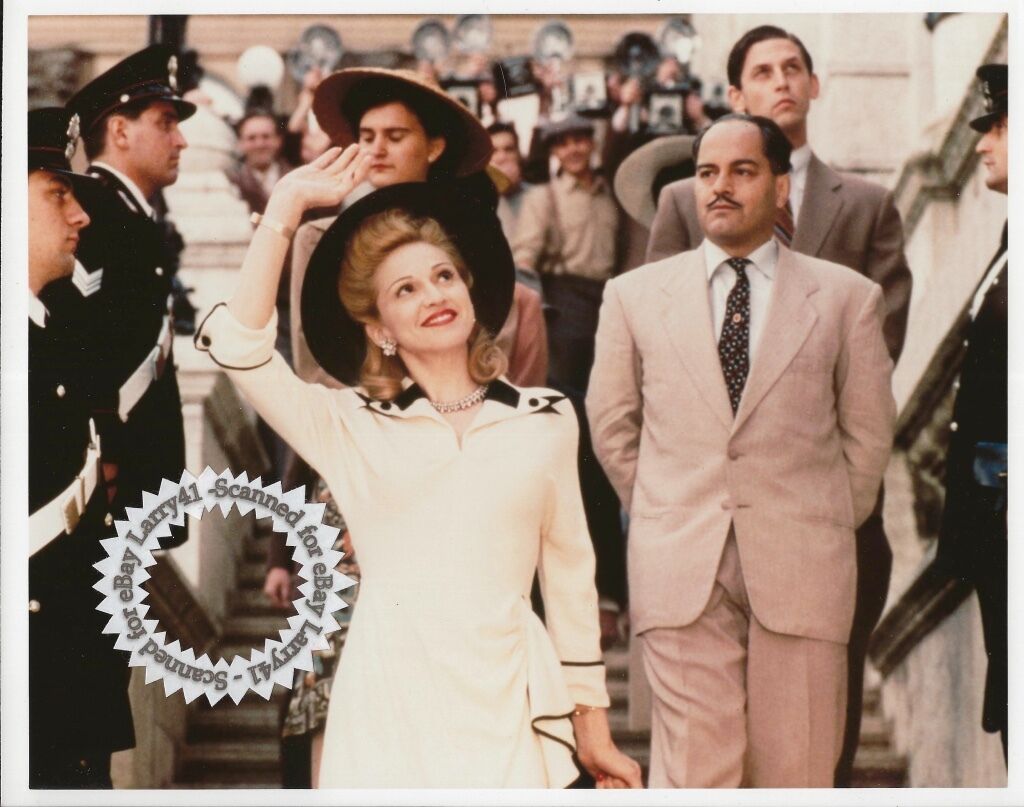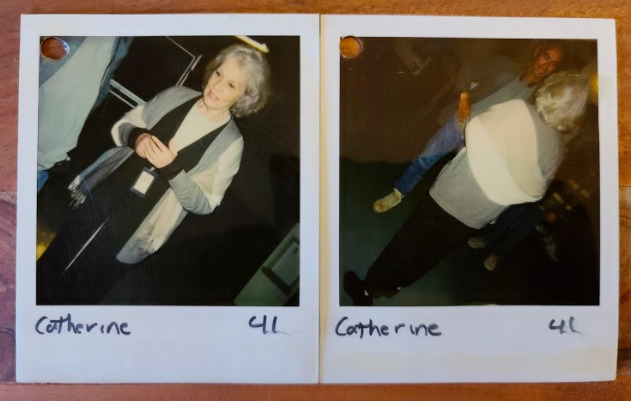-40%
Lovely MADONNA still EVITA (1997) GET SIGNED! 8x10 Color! Mint condition
$ 4.21
- Description
- Size Guide
Description
(They ALL look MUCH better than these pictures above. The circle with the words, “scanned for eBay, Larry41” does not appear on the actual photograph. I just placed them on this listing to protect this high quality image from being bootlegged.)MADONNA still EVITA (1997) GET SIGNED! 8x10 Color! Mint condition
They would look great framed on display in your home theater or to add to your portfolio or scrapbook! Some dealers by my lots (check my other auctions for lots) to break up and sell separately at classic film conventions at much higher prices than my low minimum. A worthy investment for gift giving too!
PLEASE BE PATIENT WHILE ALL PICTURES LOAD
After checking out this item please look at my other unique silent motion picture memorabilia and Hollywood film collectibles! COMBINE SHIPPING COST AND SAVE $
See a gallery of pictures of my other auctions
HERE!
This photograph may not be an original release but it is a photo chemical created pictures and not a digital copy or digital reproductions.
DESCRIPTION:
Evita is based on the musical by Andrew Lloyd Webber and Tim Rice. Actually, the film is more of an opera, with only short moments devoted to dialogue. "Evita" is the friendly, family version of the proper name "Eva," and this film tells the story of Eva Peron (1921-52), a woman whose name evokes powerful feelings in her native Argentina. Throughout this film, as in the musical, the story is explained and commented on by a character known as "Che," played here by Antonio Banderas. The film begins with the news of Evita's death, and then turns to a much earlier scene at her father's funeral. Eva (Madonna) was an illegitimate child (one of many) of a rural landowner and her seamstress mother. Hers is not a wealthy childhood by any means, and she is constantly discriminated against because of her lowly birth. She is refused admission to her father's funeral for this reason. This scene is contrasted with her own funeral, a spectacular affair, not different from the funeral of a beloved head of state. Eva Peron leaves her village at age 15, in the arms her lover Agustin Magaldi (Jimmy Nail), a traveling singer. With his help, she goes to Buenos Aires and begins her campaign to become a performer, actress, and public figure. Many men help her during these years, and she is reported to have given her favors freely. That changes when she becomes involved with Juan Peron (Jonathan Pryce). In 1944, when they meet, Peron is an ambitious young army officer, serving in the right-wing government of the time. When he falls afoul of the government and is imprisoned, Eva uses her position as a celebrity and radio performer to get him released. Peron marries his feisty mistress when he is freed from prison. Eva is a formidable supporter, and her help is crucial to his later becoming head of state. Once Juan Peron becomes the President of Argentina, Eva expects better treatment from Argentina's high society, but they snub her brutally. She, in response, diverts government money from society-led charities, and starts the Eva Peron Foundation. As its president, she works tirelessly to directly better the lot of Argentina's poor. For this work, and for having risen from poor origins to glory, she is beloved by huge masses of her fellow citizens, if not by those in high society. She also arranges for the enfranchisement of women in Argentina. Thus, her death of uterine cancer at age 33, while she was at the height of her power and influence, strikes the whole world as tragic.
CONDITION:
This quality 8 by 10 inch still photograph is in MINT physical condition. The back of the still has that slick plastic feel of the newer digital print and has the word AGFA printed on it. It is probably not a vintage original for the year of the film/event but is of a later date. I have recently acquired two huge collections from life long movie buffs who collected for decades… I need to offer these choice items for sale on a first come, first service basis to the highest bidder.
SHIPPING:
Domestic shipping would be FIRST CLASS and well packed in plastic, with several layers of cardboard support/protection and delivery tracking. International shipping depends on the location, and the package would weigh close to a half a pound with even more extra ridge packing.
PAYMENTS:
Please pay PayPal! All of my items are unconditionally guaranteed. E-mail me with any questions you may have. This is Larry41, wishing you great movie memories and good luck…
BACKGROUND:
“Evita” allows the audience to identify with a heroine who achieves greatness by--well, golly, by being who she is. It celebrates the life of a woman who begins as a quasi-prostitute, marries a powerful man, locks him out of her bedroom, and inspires the idolatry of the masses by spending enormous sums on herself. When she sings: “They need to adore me--to Christian Dior me,” she's right on the money. I begin on this note not to criticize the new musical “Evita” (which I enjoyed very much), but to bring a touch of reality to the character of Eva Peron, who, essentially, was famous because she was so very well-known. Her fame continued after her death, as her skillfully embalmed body went on to a long-running career of its own, displayed before multitudes, spirited to Europe, fought over, prayed over, and finally sealed beneath slabs of steel in an Argentine cemetery. Eva Peron lived only until 33, but she went out with a long curtain call. She was not an obvious subject for a musical. Andrew Lloyd Webber and Tim Rice, who wrote the stage version of “Evita” and whose songs are wall-to-wall in the movie, must have known that; why else did they provide a key character named Che Guevera (onstage) and Che (on screen), to ask embarrassing questions? “You let down your people, Evita,” he sings. She let down the poor, shirtless ones by providing a glamorous facade for a fascist dictatorship, by salting away charity funds, and by distracting from her husband's tacit protection of Nazi war criminals. Why, then, were Webber and Rice so right in choosing Eva Peron as their heroine? My guess is that they perfectly anticipated “Evita's” core audience--affluent, middle-aged and female. The musical celebrates Eva Peron's narcissism, her furs and diamonds, her firm management of her man. Given such enticements, what audience is going to quibble about ideology? For years I have wondered, during “Don't Cry for Me, Argentina,” why we were not to cry. Now I understand: We need not cry because (a) Evita got everything out of life she dreamed of, and (b) Argentina should cry for itself. Even poor Juan Peron should shed a tear or two; he is relegated in the movie to the status of a “walker,” a presentable man who adorns the arm of a rich and powerful woman as a human fashion accessory. All of these thoughts, as I watched Alan Parker's “Evita,” did not in the least prevent me from having a good time. I suspect Parker has as many questions about his heroine as I do, and I am sure that Che (Antonio Banderas) and Juan Peron (Jonathan Pryce) do--not to mention Oliver Stone, co-author of the screenplay. Only Evita herself, magnificently embodied by Madonna, rises above the quibbles, as she should; if there is one thing a great Evita should lack, it is any trace of self-doubt. Here we have a celebration of a legendary woman (for those who take the film superficially) and a moral tale of a misspent life (for those who see more clearly). Certainly Parker is a good director for this material. He has made more musicals than his contemporaries, not only “Bugsy Malone,” “Fame” and “The Commitments,” but especially “Pink Floyd the Wall,” one of the great modern musicals, where he uses similar images of marching automatons. Working with exteriors in Argentina and Hungary and richly detailed interior sets, he stages Evita's life as a soap opera version of “Triumph of the Will,” with goose-stepping troops beating out the cadence of her rise to glory. The movie is almost entirely music; the fugitive lines of spoken dialogue sound sheepish. Madonna, who took voice lessons to extend her range, easily masters the musical material. As importantly, she is convincing as Evita--from the painful early scene where, as an unacknowledged child, she tries to force entry into her father's funeral, to later scenes where the poor rural girl converts herself into a nightclub singer, radio star, desirable mistress, and political leader. There is a certain opaque quality in Madonna's Evita; what you see is not exactly what you get. The Che character zeroes in on this, questioning her motives, doubting her ideals, pointing out contradictions and evasions. Yet for Evita there are no inconsistencies, because everything she does is at the service of her image. It is only if you believe she is at the service of the poor that you begin to wonder. Listen closely as she sings: “For I am ordinary, unimportant And undeserving Of such attention Unless we all are I think we all are So share my glory.” The poor, in other words, deserve what Evita has, so her program consists of her having it and the poor being happy for her. After all, if she didn't have it, she'd be poor, too. In other words: The lottery is wonderful, just as long as I win it. Banderas, as Che, sees through this; his performance is one of the triumphs of the movie. He sings well, he has a commanding screen presence, and he finds a middle ground between condemnation and giving the devil her due. He is “of the people” enough to feel their passion for Evita, and enough of a revolutionary to distrust his feelings. Pryce, as the dictator, remains more difficult to read. He is grateful for the success Evita brings him (her broadcasts free him from prison, her campaigns win his elections, her fame legitimatizes his regime). But there is a quiet little scene where he knocks on her locked bedroom door and then shuffles back to his own room, and that scene speaks volumes for the haunted look in his eyes. The music, like most of the Webber/Rice scores, is repetitive to the point of brainwashing. It's as if they come up with one good song and go directly into rehearsals. The reason their songs become hits is that you've heard them a dozen times by the end of the show. But Parker's visuals enliven the music, and Madonna and Banderas bring it passion. By the end of the film we feel like we've had our money's worth, and we're sure Evita has.









